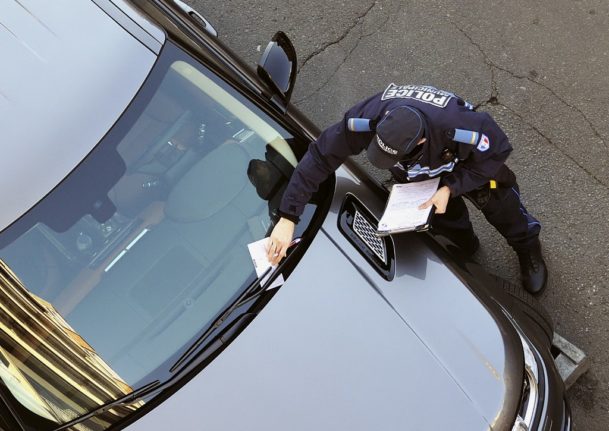Question: I recently got a parking ticket while parked in a small town in France, but I’m sure I had parked within the regulations – how do I contest this?
Parking tickets are as much a fact of frustration for motorists in France as they are elsewhere.
You know the score. You get back to your vehicle, and there’s an unpleasant surprise on your windscreen, informing you that you’ve parked illegally and that you have a fixed penalty to pay.
The notice on your windscreen is not the actual ticket. It’s a warning that you will receive a ticket. A ‘notice of violation’ – aka the ‘ticket’ – and a payment card will be sent by mail to the address of the vehicle’s registered owner.
In theory this includes cars that are registered outside France. In practice it depends on the country and there are mixed reports on whether fines are posted out to non-French addresses.
This document indicates the amount of the fine and how to pay or dispute the fine.
The fines are set at the following rates:
- Improper parking : €35 (this is the one you get if you haven’t paid in a pay-and-display space, or have overstayed the allocated time)
- Inconvenient parking : €35
- Very inconvenient parking : €135
- Unsafe parking: €135 – you also lose three points on your licence – remember French licences come with 12 points loaded on them, and you lose them if you commit an office. You also risk a driving ban for up to three years.
How to pay
You can pay your fine in several ways.
Online – click here
By app – yes, there’s an app for that. You can download the Amendes.gouv app from Google Play or App Store
By phone – call 0811 10 10 10 at any time. Be aware, this is a premium rate number
By post – send a cheque payable to Trésor public to the address indicated on the ticket. Make sure you include the payment card shown on the notice of violation
In person at an approved tobacconist – one of the many services offered at a French tabac is the one that allows you to pay certain fines, including parking tickets.
In person at a Centre des finances publiques
Deadlines
You must pay the fixed fine within 45 days (60 if you pay electronically) of the date on the notice of violation – otherwise the amount you have to pay will go up. NB – The fine is reduced by 20 percent if you pay within 30 days.
How to contest a parking ticket
You can raise your objection to a parking ticket online or by mail, within 45 days of the original fine being sent – or three months in the case of a fine being increased.
To contest a ticket online, click on the ANTAI website here
Note: you cannot contest a fine after paying it – paying the fine indicates you acknowledge the offence.
Or you can do so by post, by completing the exemption request form on your notice of violation.
You will need to include the notice of violation, and a letter, written on plain paper setting out the reasons for contesting the fine. Be aware, this is a formal letter, and it must be sent by registered mail, with notice of receipt (LRAR). If it is not sent by registered mail, the letter may be ignored.



 Please whitelist us to continue reading.
Please whitelist us to continue reading.
I got one of these once. I arrived at the car just as he finished the ticket. I said to the Gendarme that there was no sign to say there was restricted parking (i was in a public car park). The Gendarme then took me to a tent – inside the tent was a restricted parking notice saying that from 2pm that day I could no longer park in that spot.
I did appeal – but basically the reply was – you were parked there – pay